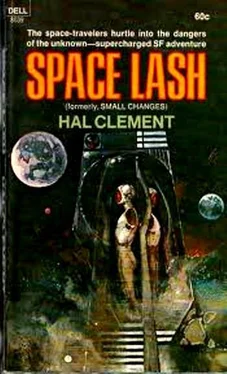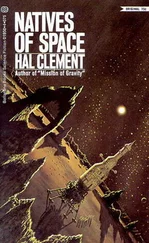Hal Clement - Space Lash
Здесь есть возможность читать онлайн «Hal Clement - Space Lash» весь текст электронной книги совершенно бесплатно (целиком полную версию без сокращений). В некоторых случаях можно слушать аудио, скачать через торрент в формате fb2 и присутствует краткое содержание. Год выпуска: 1969, Жанр: Фантастика и фэнтези, на английском языке. Описание произведения, (предисловие) а так же отзывы посетителей доступны на портале библиотеки ЛибКат.
- Название:Space Lash
- Автор:
- Жанр:
- Год:1969
- ISBN:нет данных
- Рейтинг книги:3 / 5. Голосов: 1
-
Избранное:Добавить в избранное
- Отзывы:
-
Ваша оценка:
- 60
- 1
- 2
- 3
- 4
- 5
Space Lash: краткое содержание, описание и аннотация
Предлагаем к чтению аннотацию, описание, краткое содержание или предисловие (зависит от того, что написал сам автор книги «Space Lash»). Если вы не нашли необходимую информацию о книге — напишите в комментариях, мы постараемся отыскать её.
Space Lash — читать онлайн бесплатно полную книгу (весь текст) целиком
Ниже представлен текст книги, разбитый по страницам. Система сохранения места последней прочитанной страницы, позволяет с удобством читать онлайн бесплатно книгу «Space Lash», без необходимости каждый раз заново искать на чём Вы остановились. Поставьте закладку, и сможете в любой момент перейти на страницу, на которой закончили чтение.
Интервал:
Закладка:
Physically, there was little remarkable about it. It was less massive even than his own body, though a short period of observation disclosed that it was in an orbit about the central furnace, just as the farm plots were. Sometimes its outline was clear, at others it blurred oddly. Its brightness flickered in an apparently meaningless pattern. Merely on its physical description, there was nothing remarkable about it, but it seized and held the superintendent's puzzled attention. Off his planned course though it was, he swung toward it, wondering. The student had mentioned no friends or co-workers
Gradually, details grew clearer and the superintendent's feelings grew grimmer. He did not like to believe what he saw, but the evidence was crowding in.
“Help! Please help! Master!”
The bubble of horror burst, and one of anger grew in its place. Not one of his own kind, injured or dying and an object of terror and revulsion thereby; this thing was a slave. A slave, moreover, well within the limits of the farm, where it had no business to be without supervision; a slave who dared call on him for help!
“What are you doing here?” The superintendent sent the question crackling along a tight beam toward the apparently helpless creature. “Did you enter this region without orders?”
“No, Master. I was…ordered.”
“By whom? What happened to you? Speak more clearly!”
“By — I cannot, Master. Help me!” The irregular flickering of the slave's auroral halo brightened fitfully with the effort of radiating speech.
Unsympathetic as the superintendent normally was to such beings, he realized that help must be given if he were to learn anything. Conquering a distinct feeling of repugnance, he moved up beside the slave to investigate its injuries. He expected, naturally, to find the visible results of a thorough ion-lashing, that being the principal occupational hazard faced by the slaves; but what he actually saw almost made him forget his anger.
The unfortunate creature's outer crust was pitted — dotted and cratered with a pattern of circular holes which resembled nothing the superintendent had ever encountered. He knew the long, shallow scars of an ion-lashing and the broad, smoothed areas which showed on the crust of one of his people when close exposure to a sun had boiled away portions of his mass. These marks, however, looked almost as though the slave had been exposed to a pelting by granules of solid matter!
A ridiculous thought, of course. The stupidest slave could detect and avoid the occasional bits of rock and metal which were encountered in the interstellar void. After all, they had the same sensory equipment and physical powers as the masters. An unprejudiced judge might even have said they were of the same species as the masters.
Whatever had caused the creature's injury, there was little that could be done for it. Grudgingly, inspired far more by curiosity than by sympathy, the superintendent did that little, supplying hydrocarbons and other organic matter lately skimmed from the ringed planet.
Food, however, was not enough. Bits of extraneous metal were imbedded in its body, altering the precise pattern of charged metal nodes that spelled life to these beings. Some of its own field nodes had apparently been chipped or blown away, and others were discharged. The creature's body was only a fraction of its normal size — the regular reserve of “food” compounds that ordinarily made up so much of even a slave's bulk had long since been consumed or had evaporated.
There was no doubt that it was dying. But there was some chance that it might gain strength enough to impart information if it were fed. It was — sparingly, of course.
“No sense wasting food on a slave that's about to die,” the superintendent explained without brutality.
“Certainly not, Master,” the slave agreed without resentment.
“What happened to you?” the superintendent repeated. The slave was in no condition to be coherent; but a lifetime of conditioning brought some order to its agony-dazed mind, and it answered.
“I was ordered to the inner plots — to harvest.” The word-symbols came haltingly, but with sufficient clarity to be unmistakable, shocking as their implication was.
So the student had trusted slaves near a food supply! Perhaps that accounted for the two stripped planets.
“You went to harvest when a young fool like this orders it?”
“He was a master, and he gave the order. Many of us went; many of us have been going for years — and seldom returning. We did not wish it, Master, but he ordered it. What could we do?”
“You could have asked the first superintendent who came here whether it was better to disobey a Prime Order or a young master.”
“You are the first to come, Master, as far as I know. And the young master said we were not to speak of this order to anyone. It is only because you command me to speak that I do so now — that and the fact that there is little more that he could do to me, anyway.”
The overseer ignored the pointed closing sentence. “You say many of you have been ordered to do this, but few have returned from the errand? What happened to them? What happened to you?”
“They die. I did not know how; now I suppose it must be — this way.”
There was a pause, and the supervisor was moved to sarcasm. “I suppose they are struck by meteoric particles, as you seem to have been. Do slaves absorb personal characteristics such as stupidity from their masters? Could you not dodge the meteors?”
“No, not all of them. The region near the central furnace has more of such matter than any other place I have ever seen. Some pieces are iron, some are of other matter; but they cannot be avoided. They strike too hard. They cannot be absorbed in normal fashion, but simply boil off one's body material into space. The shock is so tremendous that I, at least, could do nothing toward recovering the material until it had dissipated beyond hope of salvage. That is the reason so much of my mass is gone; it was not merely starvation.
“Some of the other slaves did better than I — as I said, some of them have survived — but others did much worse. They would dive in toward the furnace, and their bodies would come falling back out in just about the shape I am.”
“And still he sends his slaves in to harvest?”
“Yes. We did not do too badly, actually, on the largest plots; but then he got interested in the others farther in. After all, they're hotter. He ventured in himself almost to the orbit of the plot that was destroyed — did you know that? — but came out very quickly and sent us on all such journeys thereafter.
“We — or, rather, those who preceded me — cleaned off the next inner plot, the fourth from the central furnace, fairly well, though the loss of slaves was high. Then he wanted to start on the third. I was one of the first to work on this project.
“I did not expect to live, of course, after what I had heard from the others; but the order came, and I let myself fall toward the sun. My orbit passed close to the greatest of the plots, which the master has been harvesting himself, and I hoped to strengthen myself with a little food from it as I passed.”
That confession showed how certain the slave felt of his own imminent death, as well as the state of demoralization into which the student's activities had permitted his servitors to fall.
“But I did not dare take any food when the time came,” the slave went on feebly. “As I passed through the region where the destroyed plot had been, drifting particles began to grow more numerous. At first there would be an occasional bit of stone or iron, which I could dodge easily. Then they came in twos and threes, and sometimes I would have to change an escape curve in mid-maneuver. Then they came in dozens and clusters, and at last I could avoid them no longer. I was struck several times in rapid succession.
Читать дальшеИнтервал:
Закладка:
Похожие книги на «Space Lash»
Представляем Вашему вниманию похожие книги на «Space Lash» списком для выбора. Мы отобрали схожую по названию и смыслу литературу в надежде предоставить читателям больше вариантов отыскать новые, интересные, ещё непрочитанные произведения.
Обсуждение, отзывы о книге «Space Lash» и просто собственные мнения читателей. Оставьте ваши комментарии, напишите, что Вы думаете о произведении, его смысле или главных героях. Укажите что конкретно понравилось, а что нет, и почему Вы так считаете.












